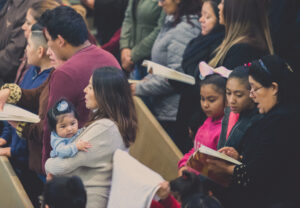
Leer el Blog Completo en Español
We also assume responsibility for bringing to the house of the Lord each year the firstfruits of our crops and of every fruit tree.
As it is also written in the Law, we will bring the firstborn of our sons and of our cattle, of our herds and of our flocks to the house of our God, to the priests ministering there.
Moreover, we will bring to the storerooms of the house of our God, to the priests, the first of our ground meal, of our grain offerings, of the fruit of all our trees and of our new wine and olive oil. And we will bring a tithe of our crops to the Levites, for it is the Levites who collect the tithes in all the towns where we work. (Nehemiah 10:35-37 –NIV)
In our context, we are used to considering congregational singing as the core of our public worship. Yes, most definitely, it is through singing together that we affirm our identity as God’s people and rejoice in the God of life and salvation. However, in biblical terms, all acts of public worship ought to lead to a particular form of life, to ethics as a way of relating to all reality. Our singing in worship should be sustained by an ethical back bone, which in this passage from Nehemiah attempts to be defined by a set of minimal requirements.
 The “minimal ethics” to which Nehemiah and the rest of the people committed included clearly defining the family identity that corresponds to the children of Israel, presenting tithes and firstfruits of the product of their labor—to sustain worship, respect the day of rest, and observe the prescriptions of the sabbatical year. They reckoned these to be the most important commandments in the whole law.
The “minimal ethics” to which Nehemiah and the rest of the people committed included clearly defining the family identity that corresponds to the children of Israel, presenting tithes and firstfruits of the product of their labor—to sustain worship, respect the day of rest, and observe the prescriptions of the sabbatical year. They reckoned these to be the most important commandments in the whole law.
We can observe that, in their attempt to affirm their identity as a people, they did not include in their “minimal ethics” the two great commandments of the law, according to the Lord Jesus: Love God with your whole being and your neighbor as yourself. We wonder why they emphasized these particular mandates.
To explain the emphasis of this commitment, we have to think of the relation between actions and meanings. One thing is the gesture, the act of presenting the firstfruits and tithes, and another thing is what that action means. The firstfruits are the beginning of the harvest. It is the first basket of oranges or apples. The tithe is one-tenth of all profit. Separating the tithe and offering the firstfruits are meaningful actions.
Caring and expressing concern about the issue of who our sons and daughters are going to marry is also a gesture that has meaning. These acts are indicators of priority. They have meaning. They point to something that is important. It is something that takes precedence. They are actions that indicate that we want to put God first in our life.
Of course, there’s always the possibility that the people remain in the action only and become indifferent to the meaning. It may be that the people think that pleasing God is simply complying with the “minimal ethics,” without understanding what the meaning behind that behavior is. In fact, that’s what the Lord Jesus criticized in scribes and Pharisees. They were so focused on tithing that they even smothered widows by forcibly extracting the tithe (even cumin) from them, but inside, their heart was bad. They were like tombs painted white. Inside, everything rotten, although outside, they meticulously observed the tithe. One thing is necessary while still doing the other. That is to say: the action must be carried out, but without losing sight of its meaning.
Where is the priority? The proverb says: Above all else, guard your heart, for everything you do flows from it. The priority, according to the Word, should not be the external aspects by themselves, because these can be faked and become cold and meaningless rituals. But if the action flows from the heart, according to the worldview of the Word, then the most important thing is there, and it indicates Who the most important person in our life is.
Let’s ask God to help us look within, to see the priorities that our actions point to. May we make sense of all our acts of worship. Amen.

